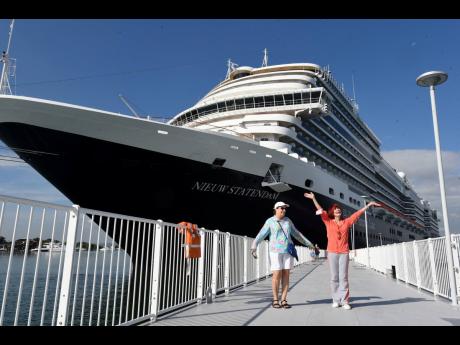J’cans to be recruited for cruise ship jobs
The Ministry of Tourism is looking to tap into the local labour force to identify, recruit, and deploy at least 10,000 of the 90,000 workers required in the global cruise industry.
Tourism Minister Edmund Bartlett says the demand stems from a shortage of workers occasioned by the COVID-19 pandemic’s disruption of tourism activities worldwide, which has resulted in a reduction in the number of persons employed in the sector.
He gave the assurance, however, that the ministry and stakeholder partners would be diligent in ensuring that the process of identifying and recruiting potential employees “does not disturb our [local] hospitality sector, which is so key”.
As such, Bartlett said focus would be placed on areas “where we don’t have the strength of the hotels”, among other related offerings, and which would have suitable persons readily available to take up available job openings.
He was speaking during a ceremony at The Jamaica Pegasus hotel in New Kingston for the presentation of Disaster Risk Management Tools for tourism and allied industry stakeholders on June 10.
Bartlett said the demand for employees within the tourism industry is consistent with those in various domestic and global sectors and forms part of the stakeholder response in the overall post-COVID-19 recovery efforts.
Consequently, he said a level of portability must be created and facilitated among local workers that would enable them taking up the emerging job opportunities, noting that “it’s one that we have to encourage, but [which] we also have to manage”.
The tourism minister emphasised that it was also imperative that the welfare of the workers be safeguarded to ensure that they are not exploited.
His comment came against the background of what he said are emerging reports suggesting that persons have been posing as recruiting agents operating within the tourism industry and are charging potential workers up to $200,000 to secure jobs on their behalf.
Bartlett urged persons seeking employment in the industry to refrain from making payments to “intermediaries” who he implored to desist from charging fees.
“Stop it! Nobody is to pay an agent or any intermediary for any recruitment opportunities for work in the tourism sector,” the minister insisted.
He warned that “if we find it [happening], we’re going to treat [the perpetrators] as scammers, and the law will take its course, I’m sure”.
“We [must] seek to eliminate that mindset [of persons who would want] to make profit from the [misfortunes] of others,” Bartlett added.
The comprehensive suite of disaster risk management tools is designed to bolster the tourism sector’s resilience and safeguard it against disruptions such as weather-related events, among other crises.
These tools include a disaster risk management plan template and guidelines, a business continuity plan template and guidebook, and a national destination assurance framework and strategy.
They are intended to provide clear guidance for the management and staff of tourism entities on the basic infrastructure and requisite operating procedures to mitigate, prepare for, respond to, and recover from emergencies.
The business continuity plan’s development has been complemented by the training and certification of several representatives of allied state agencies, who will be tasked with engaging tourism-industry stakeholders and guiding the implementation of the document’s guidelines.
JIS


